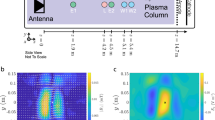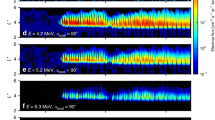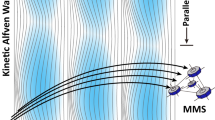Abstract
The injection of an electron beam into the magnetosphere has been considered a straightforward technique for studying the large-scale structure of the Earth's environment. The large current released in the magnetosphere by the ARAKS experiment has produced many results which are not yet well understood.
This is a preview of subscription content, access via your institution
Access options
Subscribe to this journal
Receive 51 print issues and online access
$199.00 per year
only $3.90 per issue
Buy this article
- Purchase on Springer Link
- Instant access to full article PDF
Prices may be subject to local taxes which are calculated during checkout
Similar content being viewed by others
References
Hess, W. N. Science 164, 1512–1513 (1969).
Winckler, J. R. Space Sci. Rev. 15, 751–780 (1974).
Cambou, F. et al. Space Sci. Res. 15 (1975).
Alekhin, J. U. et al. Cos. Electrodyn. 3, 406–415 (1973).
Pellat, R. et al. C. R. Acad. Sci. 276B, 685–687 (1973).
Author information
Authors and Affiliations
Rights and permissions
About this article
Cite this article
Cambou, F., Lavergnat, J., Migulin, V. et al. ARAKS—Controlled or puzzling experiment?. Nature 271, 723–726 (1978). https://doi.org/10.1038/271723a0
Received:
Accepted:
Published:
Issue Date:
DOI: https://doi.org/10.1038/271723a0
This article is cited by
-
Electron beam emission from the EXOS-B (JIKIKEN) satellite as a powerful diagnostic tool in the magnetosphere
Astrophysics and Space Science (1984)
-
Problems with mesospheric electric field measurements
Nature (1980)
Comments
By submitting a comment you agree to abide by our Terms and Community Guidelines. If you find something abusive or that does not comply with our terms or guidelines please flag it as inappropriate.



